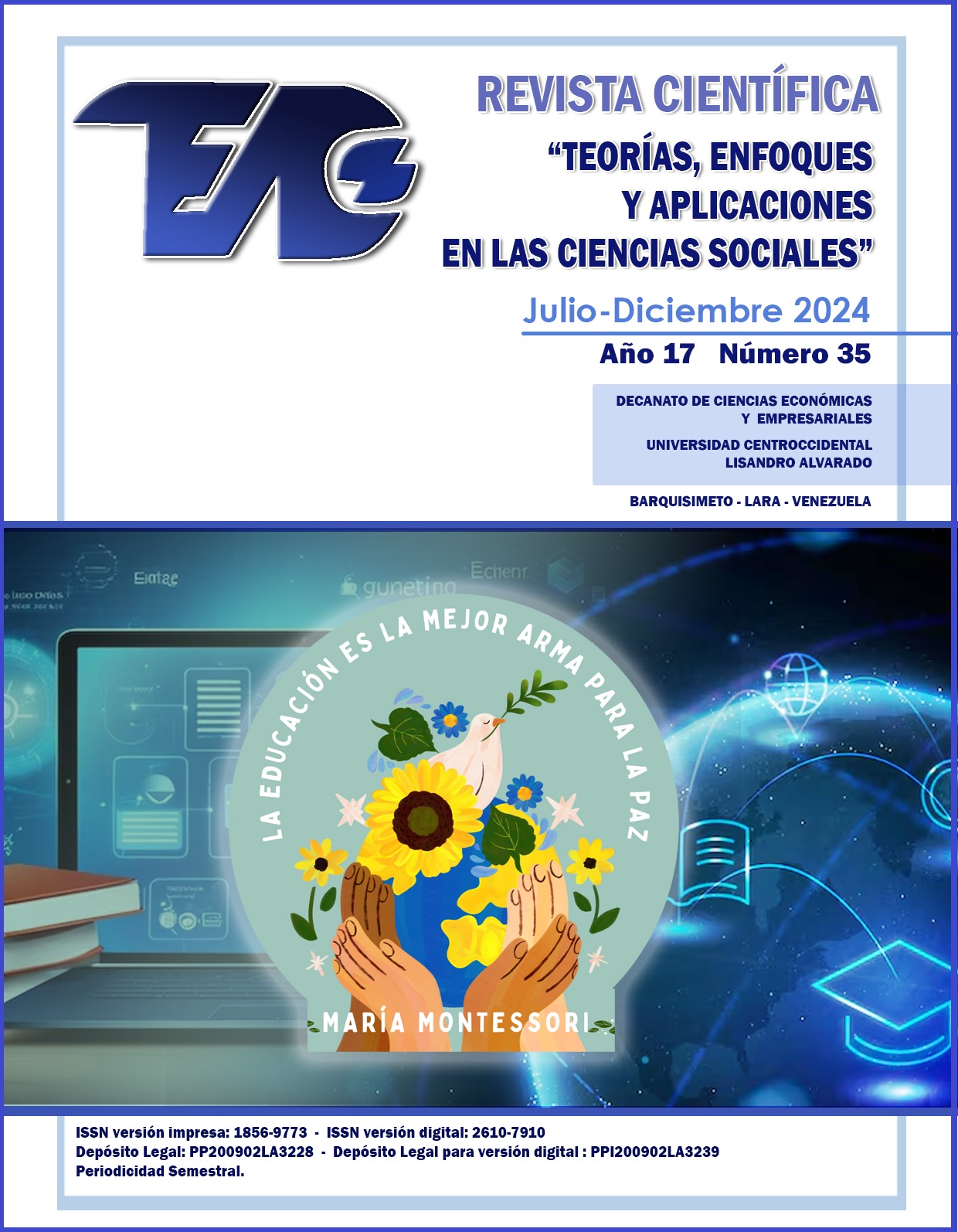Administration Career, under the methodology of the functional and competency approach
Keywords:
administration career, certifications, competencies, functional analysis, multimodalityAbstract
This research consisted of a four-year project for the administration degree for the Deanship of Economic and Business Sciences (DCEE) of the Universidad Centroccidental Lisandro Alvarado (UCLA), based on multimodality and the competency-based approach, which was carried out through the dimensioned development of the different fundamental elements of administration in the sectors of the administrator's field, with the intention of updating the administrator's profile to the labor changes, promoting the need for a renewal in the curricular units that show in their contents elements of competencies that contribute to the training of professionals suitable for the labor task both in national and international organizations, constituting this analysis the basic inputs for the proposal. The research was methodologically framed within the social sciences and addressed through a feasible project model. The study was analytical-descriptive, with a documentary and bibliographical basis. The operational achievement of the objectives was reached through the methodology of functional analysis. Regarding the design, it will be made up of three (03) stages, a first stage where the curriculum of the different study programs will be analyzed in order to know the link between the programmatic contents and the actions from the professional point of view in the different productive sectors with the graduate profile, resulting in the development of a second stage, a detailed functional map. For the last stage, consisting of two phases, one of construction of the curriculum of the career and the other within the structure of the curriculum units that lead to certifications in order to enable a new academic perspective focused on the experience of current work, and on incorporation into the world reality.
Downloads
References
Ausubel, David. (2005). Psicología Educativa. Un punto de Vista Cognoscitivo. 2da Edición. Trillas. México
Bisquerra, R. (2002). Metodología de la Investigación Educativa. Editorial la muralla S.A.
Bruner, J. (2000). Globalización y el futuro de la educación: tendencias, desafíos, estrategias. Seminario sobre Prospectiva de la Educación en la Región de América Latina y el Caribe UNESCO, Santiago de Chile, 23 al 25 de agosto del 2000
CINTERFOR (2002). El enfoque de la Competencia Laboral: Manual de Formación. Disponible:
www.ilo.org/public/spanish/region/ampro/cinterfor/publ/man_cl/index.htm
Dávila, S (2000) El aprendizaje significativo, Esa extraña expresión (utilizada por todos y comprendida por pocos). Contexto Educativo, nº 9, http://contexto-educativo.com.ar/2000/7/nota-08.htm [Consulta: 29-1-2011].
Delors, J. (1996). La educación encierra un tesoro. Publicaciones UNESCO. Librería México. México.
Delors, j. (2000). La educación encierra un tesoro. Informe a la UNESCO de la Comisión Internacional sobre la Educación para el Siglo XXI. Ediciones UNESCO. México
Díaz Barriga, F. (2003). Desarrollo del currículo: La investigación curricular en México. La década de los noventa. México: UNAM.
Ertmer, A., Newby, J. (1993). Behaviorism, cognitivism, constructivism: Comparing critical features from an instructional design perspective
Ferrés, Joan y Marqués Graells, Pere. (1996). Comunicación Educativa y Nuevas Tecnologías. Barcelona: Editorial Praxis.
Finkel.D (2008) Dar clases con la boca cerrada. Barcelona. Universidad de Valencia. España.
Ibefop (2000), Análisis Ocupacional y Funcional del Trabajo
Insaforp (2001), Una Metodología de Diseño Curricular para Programas de Formación Profesional por Competencias.
Organización de Estados Iberoamericanos para la Educación, la Ciencia y la Cultura (OEI) (2008). Metas educativas 2021. La educación que queremos para la generación de los bicentenarios Madrid España.
Peñaloza, Walter. (1999). El problema de las competencias. Universidad del Zulia.
Proyecto Tuning (2003). Informe final, proyecto piloto fase I. Universidad de Deusto. Bilbao. España.
República Bolivariana de Venezuela (1980). Ley Orgánica de Educación. Caracas
Ruiz (1988). Instrumentos de investigación, procedimientos para su diseño y validación. Ediciones CIDEG. C.A. Venezuela
Sabino, C (1992) El proceso de Investigación. Ed. Panapo, Caracas.
UCLA (2023). Políticas de Docencia de Pregrado. Barquisimeto Venezuela.
UCLA (2009). Reglamento Interno de la Educación a Distancia en la Universidad Centroccidental “Lisandro Alvarado”. (SEDUCLA) Barquisimeto, Venezuela.
UCLA (2023). Modelo Educativo. Comisión Central de currículo. Vice-Rectorado Académico
Published
How to Cite
Issue
Section

This work is licensed under a Creative Commons Attribution-NonCommercial-ShareAlike 4.0 International License.
Derechos del/de autor/es a partir del año de publicación
Esta obra está bajo la licencia:
Creative Commons Reconocimiento-NoComercial-CompartirIgual 4.0 Internacional (CC BY-NC-SA 4.0)
Las opiniones expresadas por los autores no necesariamente reflejan la postura del editor de la publicación ni de la UCLA. Se autoriza la reproducción total o parcial de los textos aquí publicados, siempre y cuando se cite la fuente completa y la dirección electrónica de esta revista. Los autores(as) tienen el derecho de utilizar sus artículos para cualquier propósito siempre y cuando se realice sin fines de lucro. Los autores(as) pueden publicar en internet o cualquier otro medio la versión final aprobada de su trabajo, luego que esta ha sido publicada en esta revista.



